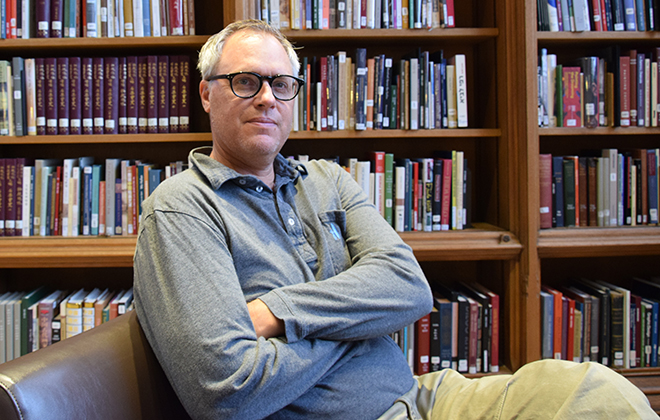
When Gregg Latterman arrived at PricewaterhouseCoopers (PwC) for his first day on the job as a CPA, he had no idea that in just a few years he would be the CEO of his own record label. Having just earned his bachelor’s degree in accounting from Michigan State University, he passed his CPA exam, moved to Boston and started his first nine-to-five job. But within a week, he was bored.
“It was, like, not me at all. I hated wearing a suit,” said Latterman, now an adjunct professor in the School of Communication and the Farley Center for Entrepreneurship and Innovation. “So I decided I wanted to start a company that made some sort of a product that mattered to somebody.”
In that moment of realization more than 20 years ago, Latterman chose to leave behind the corporate world and pursue his love of music. He made it his mission to achieve both personal happiness and professional success. But here at NU he has a new goal – to share his knowledge and experiences with as many people as possible, including his students.
Latterman’s passion for music is deep rooted, and predates today’s age of Spotify and YouTube sensations.
“In 1993, when I quit my job, the Internet didn’t matter,” Latterman said. “There were these great pockets of band all over the country, and no one could find them.” But Latterman, thanks to a childhood spent ski racing across the U.S., had friends from near and far that shared their music tastes with him.
“They would tell me what they liked and what they didn’t like,” Latterman said. “And in turn, they would say, ‘Well, what about this band? What about that band?’ And they’d send me CDs. So I realized, ‘I know every great band,’ and I decided that there was a market.”
Three years after graduating from college, Latterman resigned from his job at PwC and enrolled at Kellogg to enhance his business management skills. All the while, he was listening to demo CDs, meeting with musicians and laying the foundation for his company, Aware Records.
“By the time I graduated in ‘96, I actually had 8 employees,” Latterman said.
He also had a deal with music empire Columbia Records. Latterman and his team provided the company with discovered talent, and in turn received funding and resources to help their artists thrive, he said.
Within the label’s first few years, Aware Records signed Train, Five for Fighting and John Mayer. Latterman also founded A-Squared Management to manage musicians on different labels. He said it was a natural evolution: What started as his small label became a thriving company. But Latterman still maintained close relationships with his artists, even as the business grew.
“John Mayer’s first time in Chicago, he slept in my house in Evanston and left the door open,” Latterman said. “So we came home and thought the place was robbed.”
During its 15-year deal with Columbia Records, Aware Records sold 25 million albums. The label was managing 15 different bands and business was doing well, but Latterman became unsure about whether the success was worthwhile.
Latterman got into the music industry because he wanted to help aspiring artists achieve their potential and share their music with a large audience. For years, Latterman’s home served as a hub for his artists. They kept coming back to Chicago, because they knew that they always had a place to stay.
“Literally the Train guy used to sleep on my floor,” Latterman said. And when Five for Fighting came to town for a show, they put on a private concert in Latterman’s backyard.
But over time, Latterman felt less like a friend or a hands-on mentor and more like a crisis manager. Instead of being creative and innovative, Latterman found himself constantly taking care of logistical problems. He also felt pressure to move to Los Angeles or New York, and did not want to uproot his wife and three children from their lives. Latterman decided it was time for a change.
Latterman, then 45, decided to go back to school. After receiving a master’s degree in positive psychology from Pennsylvania University, he became a professor at NU.
Latterman’s undergraduate course “Positive Entrepreneurship: Profits and Meaning,” and graduate course “NUvention: Arts,” have given him a platform to encourage students to think about how they can integrate their passions and values into their professions. Through writing assignments, group projects, readings and guest speakers, both classes encourage students to think about how they can integrate their passions and values into their professions.
Medill senior Lori Janjigian learned most from Latterman’s candidness about the twists and turns of his career. She said Latterman made an effort to reassure his students that uncertainty is acceptable.
“That is really a different piece of advice than you necessarily hear at Northwestern. I think everyone here seems to have it all figured out,” Janjigian said. “It’s nice to hear the alternative of, ‘just relax.’”
Janjigian said Latterman encouraged his students to delve deep into their personal histories and to think critically about what would make them happy in a career.
“I try to really give them a roadmap,” Latterman said. “At the end of the day, it’s up to the students to make decisions and live it.”